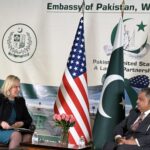On May 6, 2025, the Government of India officially launched Operation Sindoor, conducting targeted strikes on several locations in Pakistan and Pakistan-occupied Jammu and Kashmir (PoJK). The military action came in response to a terrorist attack in Pahalgam, Jammu and Kashmir, on April 22, which claimed the lives of 26 civilians.
In a joint press briefing on May 7, Wing Commander Vyomika Singh and Colonel Sofia Qureshi confirmed that the operation had “successfully destroyed” nine terrorist camps located across both Pakistan and PoJK. Foreign Secretary Vikram Misri was also present at the briefing.
“Some of the well-known training camps are located as you can see on the screen. They are distributed from Sawai Nala in the north, counting to approximately 21, ending at Bahawalpur to the south,” said Wing Commander Singh.

Singh emphasized that the targets were chosen based on “credible intelligence inputs” regarding their involvement in planning and executing terrorist activities.
“The locations were so selected to avoid damage to civilian infrastructures and loss of any civilian lives. This was done with due diligence and the camps selected for targeting and their engagement will now be shown to you one by one,” she explained.
Detailing the technical aspects of the mission, Singh noted that the operation employed “precision capability” and advanced technology to minimize collateral damage.
“Niche technology weapons with careful selection of warheads was ensured, so that there will be no collateral damage. The point of impact at each of the target was a specific building or a group of buildings,” she said, emphasizing that the strikes were executed with “clinical efficiency.”

She added that the operation underscores the professionalism and strategic discipline of the Indian Armed Forces. No military establishments were targeted, and the Indian response was measured.
“However, it must be said that the Indian armed forces are fully prepared to respond to Pakistani misadventures, if any, that will escalate the situation,” she warned.
“No military installation was targeted in Pakistan during ‘Operation Sindoor,’” Colonel Qureshi said.
Foreign Secretary Misri stated, “Earlier this morning as you would be aware, India exercised its right to respond and pre-empt as well as deter more such cross-border attacks. These actions were measured, non-escalatory, proportionate, and responsible.” He clarified that the strikes were aimed at dismantling terrorist infrastructure and eliminating operatives preparing for cross-border infiltration.

He described the April 22 attack in Pahalgam as one of “extreme barbarity,” noting that most victims were killed at close range and in front of their families. The brutality, he said, was intended to traumatize and send a threatening message.
Misri asserted that the attack was intended to destabilize the growing normalcy in Jammu and Kashmir, particularly targeting the region’s vital tourism sector, which saw a record 23 million visitors last year.
“The calculation, presumably, was that harming growth and development in the Union Territory would help keep it backward and create fertile ground for continued cross-border terrorism from Pakistan,” he added. “The manner of the attack was also driven by an objective of provoking communal discord, both in Jammu and Kashmir and the rest of the Nation. It is to the credit of the government and the people of India that these designs were foiled.”
Ongoing investigations, according to Misri, have revealed communication links between the terrorists and handlers based in Pakistan. The attack was claimed by The Resistance Front, and its statements were shared by social media accounts linked to Lashkar-e-Taiba.
“Identification of the attackers, based on eyewitness accounts, as well as other information available to law enforcement agencies, has also progressed,” Misri said. “Our intelligence has developed an accurate picture of the planners and backers of this team,” he added, pointing to Pakistan’s established record of facilitating cross-border terrorism.
Misri also criticized Pakistan’s inaction, noting that even two weeks after the attack, there had been no concrete measures taken to dismantle the terrorist infrastructure on its soil. “Instead, all it has indulged in are denials and allegations,” he said, adding that intelligence monitoring had indicated the possibility of further planned attacks, necessitating a deterrent and pre-emptive response.

He referenced a United Nations Security Council press statement from April 25, which called for holding perpetrators accountable. “India’s latest actions should be seen in this context,” he asserted.
Speaking at the 66th Raising Day of the Border Roads Organization in New Delhi on May 7, Defense Minister Rajnath Singh also addressed the operation. “Through Operation Sindoor, India has used its ‘Right to Respond’ to the attack on its soil, and the Armed Forces scripted history by acting with precision, precaution & compassion to destroy the camps used to train terrorists in Pakistan and PoK,” he said.
The defense minister confirmed that the mission went as planned, with targets neutralized and no civilian casualties. He commended the Armed Forces for their execution of a “befitting reply” under the leadership of Prime Minister Narendra Modi.
In response, Pakistan’s Prime Minister Shehbaz Sharif condemned the strikes, calling India a “treacherous enemy” and alleging that the attack targeted five locations within Pakistan.
“This heinous act of aggression will not go unpunished. Pakistan reserves the absolute right to respond decisively to this unprovoked Indian attack — a resolute response is already underway,” he said. Sharif added that the people of Pakistan and its armed forces remain united and fully prepared to confront any threat with “strength and determination.”






